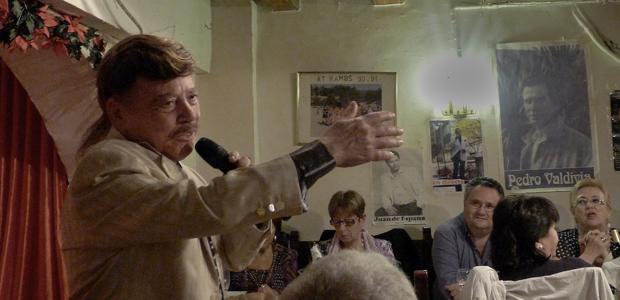Barcelona bar tries to bring back long-gone musical style
Manolo Carrion hosts O’Barquiño’s Saturday night Coplas, a gathering of Spanish singers who never quite became stars. But for a couple of hours on Saturday nights, they shine. The Copla and other traditional romantic music forms were popular thr
Each Saturday night, in a small room above a working class bar in downtown Barcelona, a mostly elderly audience gets transported back in time, to the glory days of the copla and other forms of romantic Spanish popular music.
Or, once popular that is. Hardly anyone sings this stuff today. But at Luis Diaz’s bar, O’Barquiño, the copla still rings clear.
Diaz is a stout fellow who likes to ply visitors with a liquor called Orujo. Then he drags them upstairs into his time machine.
In a dimly lit room, a crowd of about thirty couples, most of them elderly, sits at tables. They drink sparkling wine and clap, their eyes glazed over with nostalgia. An elderly singer moves among them, dressed in a flamboyant green dress, wearing pancake makeup and bright plastic flowers in her hair.
Welcome to Saturday Night Coplas. This isn’t kitsch. It’s not ironic, or hip, like the comebacks of Tom Jones or Tony Bennett. It’s just ordinary folks enjoying music that’s fallen by the wayside in most of Spain.
Back in the 1970s and 80s, O’Barquiño’s fare was topping Spanish charts, led by the diva Isabel Pantoja. But that era is over.
Downstairs at the bar during a break, Diaz said he missed those days. He started coplas night because all the popular clubs had shut down years ago. He called his copla night a humble stab at bringing back the old days, and making people feel at home.
“The people who sing are all talented,” he said, “but for some reason never made it to the big leagues. So we brought them here.”
Retired cook Paco Carmona is one of those minor leaguers.
“I never made a living as a singer,” he said. “First, you need a guardian angel working for you. To avoid going hungry, I spent my life working, at all kinds of jobs.”
But, he said, if someone called him for a show once in a while, he’d go sing.
On a recent night Carmona’s fans sang to him first. The tune? Happy Birthday. Then he took the mic, and sang as if this were Carnegie Hall.
Emceeing the show each Saturday night is Manolo Carrion, the closest thing O’Barquiño has to a real star. There’s a poster of him on the wall, looking about thirty years younger. Today, he’s got the same mustache and smile, and he’s added a reddish-brown toupee.
Carrion said copla isn’t just about singing lyrics.
“A copla can capture the entire life of a person, in three minutes,” he said. “That’s very hard to do. All the way till death. And all the joy and suffering along the way. It’s poetry.”
But it is poetry that had its last hurrah a generation ago. Carrion lamented that all the great composers of Spanish popular music have died off, and no one has stepped up to fill their shoes. Although, he said, he keeps trying.
He crushed his cigarette, and then took the stage, to belt out a song from his own repertoire.
And for a moment, before these adoring fans, you got the feeling he had made it, that this was the big leagues.
